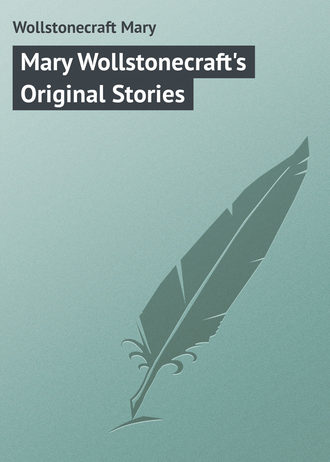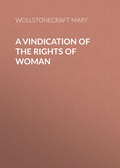
Wollstonecraft Mary
Mary Wollstonecraft's Original Stories
CHAPTER XVII
The Benefits arising from Devotion. – The History of the Village School-mistress concluded.
As soon as the cloth was removed, Mrs. Mason concluded the narration; and the girls forgot their fruit whilst they were listening to the sequel.
Anna endured this treatment some years, and had an opportunity of acquiring a knowledge of the world and her own heart. She visited her mother’s father, and would have remained with him; but she determined not to lessen the small pittance which he had anxiously saved out of a scanty income for two other grand-children. She thought continually of her situation, and found, on examining her understanding, that the fashionable circle in which she moved, could not at any rate have afforded her much satisfaction, or even amusement; though the neglect and contempt that she met with rendered her very uncomfortable. She had her father’s spirit of independence, and determined to shake off the galling yoke which she had long struggled with, and try to earn her own subsistence. Her acquaintance expostulated with her, and represented the miseries of poverty, and the mortifications and difficulties that she would have to encounter. Let it be so, she replied, it is much preferable to swelling the train of the proud or vicious great, and despising myself for bearing their impertinence, for eating their bitter bread; – better, indeed, is a dinner of herbs with contentment. My wants are few. When I am my own mistress, the crust I earn will be sweet, and the water that moistens it will not be mingled with tears of sorrow or indignation.
To shorten my story; she came to me, after she had attempted several plans, and requested my advice. She would not accept of any considerable favour, and declared that the greatest would be, to put her in a way of supporting herself, without forfeiting her highly valued independence. I knew not what to advise; but whilst I was debating the matter with myself, I happened to mention, that we were in want of a school-mistress. She eagerly adopted the plan, and persevering in it these last ten years, I find her a most valuable acquisition to our society.
She was formed to shine in the most brilliant circle – yet she relinquished it, and patiently labours to improve the children consigned to her management, and tranquillize her own mind. She succeeds in both.
She lives indeed alone, and has all day only the society of children; yet she enjoys many true pleasures; dependence on God is her support, and devotion her comfort. Her lively affections are therefore changed into a love of virtue and truth: and these exalted speculations have given an uncommon dignity to her manners; for she seems above the world, and its trifling commotions. At her meals, gratitude to Heaven supplies the place of society. She has a tender, social heart, and, as she cannot sweeten her solitary draught, by expressing her good wishes to her fellow-creatures, an ejaculation to Heaven for the welfare of her friends is the substitute. This circumstance I heard her mention to her grandfather, who sometimes visits her.
I will now make some alteration in my dress, for when I visit those who have been reduced from their original place in society by misfortunes, I always attend a little to ceremony; lest too much familiarity should appear like disrespect.
CHAPTER XVIII
Visit to the School-mistress. – True and false Pride.
Their dress was soon adjusted, and the girls plucked flowers to adorn themselves, and a nosegay to present to the school-mistress, whose garden was but small.
They met the children just released from confinement; the swarm came humming round Mrs. Mason, endeavouring to catch her eye, and obtain the notice they were so proud of. The girls made their best courtesies, blushing; and the boys hung down their heads, and kicked up the dust, in scraping a bow of respect.
They found their mistress preparing to drink tea, to refresh herself after the toils of the day; and, with the ease peculiar to well-bred people, she quickly enabled them to partake of it, by giving the tea-board a more sociable appearance.
The harvest-home was soon the subject of conversation, and the harper was mentioned. The family pride of the Welsh, said Anna, has often diverted me; I have frequently heard the inhabitants of a little hut, that could scarcely be distinguished from the pig-sty, which stood in the front of it, boast of their ancestors and despise trade. They have informed me, that one branch of their family built the middle aisle of the church; that another beautified the chancel, and gave the ten commandments, which blaze there in letters of gold. Some rejoice that their forefathers sleep in the most conspicuous tombs – and that their ashes have an inscription to point out where they are returning to their mother earth. And those graves, which only a little stone at the head gives consequence to, are adorned every Sunday with flowers, or ever-greens. We perceive, in all the various customs of men, a desire to live in the past and in the future, if I may be allowed the expression.
Mrs. Mason then observed, that of all the species of pride which carry a man out of himself, family pride was the most beneficial to society. Pride of wealth produces vanity and ostentation; but that of blood seems to inspire high notions of honour, and to banish meanness. Yet it is productive of many ill consequences, the most obvious is, that it renders individuals respectable to the generality, whose merit is only reflected: and sometimes the want of this accidental advantage throws the most shining personal virtues and abilities into obscurity. In weak minds this pride degenerates into the most despicable folly; and the wise will not condescend to accept of fame at second-hand, replied Anna. We ought to be proud of our original, but we should trace it to our Heavenly Father, who breathed into us the breath of life. – We are His children when we try to resemble Him, when we are convinced that truth and goodness must constitute the very essence of the soul; and that the pursuit of them will produce happiness, when the vain distinctions of mortals will fade away, and their pompous escutcheons moulder with more vulgar dust! But remember, my young friends, virtue is immortal; and goodness arises from a quick perception of truth, and actions conformable to the conviction.
Different subjects beguiled the time, till the closing evening admonished them to return home; and they departed reluctantly, filled with respect.
CHAPTER XIX
Charity. – The History of Peggy and her Family. – The Sailor’s Widow.
I have often remarked to you, said Mrs. Mason, one morning, to her pupils, that we are all dependent on each other; and this dependence is wisely ordered by our Heavenly Father, to call forth many virtues, to exercise the best affections of the human heart, and fix them into habits. While we impart pleasure we receive it, and feel the grandeur of our immortal soul, as it is constantly struggling to spread itself into futurity.
Perhaps the greatest pleasure I have ever received, has arisen from the habitual exercise of charity, in its various branches: the view of a distressed object has made me now think of conversing about one branch of it, that of giving alms.
You know Peggy, the young girl whom I wish to have most about my person; I mean, I wish it for her own sake, that I may have an opportunity of improving her mind, and cultivating a good capacity. As to attendance, I never give much trouble to any fellow-creature; for I choose to be independent of caprice and artificial wants; unless indeed, when I am sick; then, I thankfully receive the assistance I would willingly give to others in the same situation. I believe I have not in the world a more faithful friend than Peggy; and her earnest desire to please me gratifies my benevolence, for I always observe with delight the workings of a grateful heart.
I lost a darling child, said Mrs. Mason, smothering a sigh, in the depth of winter – death had before deprived me of her father, and when I lost my child – he died again.
The wintery prospects suiting the temper of my soul, I have sat looking at a wide waste of trackless snow for hours; and the heavy sullen fog, that the feeble rays of the sun could not pierce, gave me back an image of my mind. I was unhappy, and the sight of dead nature accorded with my feelings – for all was dead to me.
As the snow began to melt, I took a walk, and observed the birds hopping about with drooping wings, or mute on the leafless boughs. The mountain, whose sides had lost the snow, looked black; yet still some remained on the summit, and formed a contrast to diversify the dreary prospect.
I walked thoughtfully along, when the appearance of a poor man, who did not beg, struck me very forcibly. His shivering limbs were scarcely sheltered from the cold by the tattered garments that covered him; and he had a sharp, famished look. I stretched out my hand with some relief in it, I would not enquire into the particulars of such obvious distress. The poor wretch caught my hand, and hastily dropping on his knees, thanked me in an extacy, as if he had almost lost sight of hope, and was overcome by the sudden relief. His attitude, for I cannot bear to see a fellow-creature kneel, and eager thanks, oppressed my weak spirits, so that I could not for a moment ask him any more questions; but as soon as I recollected myself, I learned from him the misfortunes that had reduced him to such extreme distress, and he hinted, that I could not easily guess the good I had done. I imagined from this hint that he was meditating his own destruction when I saw him, to spare himself the misery of seeing his infant perish, – starved to death, in every sense of the word.
I will now hasten to the sequel of the account. His wife had lately had a child, she was very ill at the time, and want of proper food, and a defence against the inclemency of the weather, hurried her out of the world. The poor child, Peggy, had sucked in disease and nourishment together, and now even that wretched source had failed – the breast was cold that had afforded the scanty support; and the little innocent smiled, unconscious of its misery. I sent for her, added Mrs. Mason, and her father dying a few years after, she has ever been a favourite charge of mine, and nursing of her, in some measure, dispelled the gloom in which I had been almost lost. – Ah! my children, you know not how many, ‘houseless heads bide the pitiless storm!’
I received soon after a lesson of resignation from a poor woman, who was a practical philosopher.
She had lost her husband, a sailor, and lost his wages also, as she could not prove his death. She came to me to beg some pieces of silk, to make some pin-cushions for the boarders of a neighbouring school. Her lower weeds were patched with different coloured rags; but they spoke not variety of wretchedness, on the contrary, they shewed a mind so content, that want, and bodily pain, did not prevent her thinking of the opinion of casual observers. This woman lost a husband and a child suddenly, and her daily bread was precarious. – I cheered the widow’s heart, and my own was not quite solitary.
But I am growing melancholy, whilst I am only desirous of pointing out to you how very beneficial charity is – because it enables us to find comfort when all our worldly comforts are blighted: besides, when our bowels yearn to our fellow-creatures, we feel that the love of God dwelleth in us – and then we cannot always go on our way sorrowing.
CHAPTER XX
Visit to Mrs. Trueman. – The Use of Accomplishments. – Virtue the Soul of all.
In the afternoon they visited Mrs. Trueman unexpectedly, and found her sitting in the garden playing to her children, who danced on the green sod. She approached to receive them, and laid aside her guitar; but, after some conversation, Mrs. Mason desired her to take it up again, and the girls joined in the request. While she was singing Mary whispered Mrs. Mason, that she would give the world to be able to sing as well. The whisper was not so low but a part of it reached Mrs. Trueman’s ears, who said to her, smiling, my young friend, you value accomplishments much too highly – they may give grace to virtue – but are nothing without solid worth. – Indeed, I may say more, for any thing like perfection in the arts cannot be attained, where a relish; nay, a delight in what is true and noble is wanting. A superficial observer may be pleased with a picture in which fine colours predominate; and quick movements in music may tickle the ear, though they never reach the heart: but it is the simple strain which affection animates, that we listen to with interest and delight. Mr. Trueman has a taste for the fine arts; and I wish in every thing to be his companion. His conversation has improved my judgment, and the affection an intimate knowledge of his virtues has inspired, increases the love which I feel for the whole human race. He lives retired from the world; to amuse him after the business of the day is over, and my babes asleep, I sing to him. A desire to please, and the pleasure I read in his eyes, give to my music energy and tenderness. When he is ruffled by worldly cares, I try to smooth his wrinkled brow, and think mine a voice of melody, when it has had that effect.
Very true, replied Mrs. Mason, accomplishments should be cultivated to render us pleasing to our domestic friends; virtue is necessary; it must ever be the foundation of our peace and usefulness; but when we are capable of affection, we wish to have something peculiar to ourselves. We study the taste of our friends, and endeavour to conform to it; but, in doing so, we ought rather to improve our own abilities than servilely to copy theirs. Observe, my dear girls, Mrs. Trueman’s distinction, her accomplishments are for her friends, her virtues for the world in general.
I should think myself vain, and my soul little, answered Mrs. Trueman, if the applause of the whole world, on the score of abilities, which did not add any real lustre to my character, could afford me matter of exultation. The approbation of my own heart, the humble hope of pleasing the Most High, elevates my soul; and I feel, that in a future state, I may enjoy an unspeakable degree of happiness, though I now only experience a faint foretaste. Next to these sublime emotions, which I cannot describe, and the joy resulting from doing good; I am happy when I can amuse those I love; it is not then vanity, but tenderness, that spurs me on, and my songs, my drawings, my every action, has something of my heart in it. When I can add to the innocent enjoyments of my children, and improve them at the same time, are not my accomplishments of use? In the same style, when I vary the pleasures of my fire-side, I make my husband forget that it is a lonely one; and he returns to look for elegance at home, elegance that he himself gave the polish to; and which is only affected, when it does not flow from virtuous affections.
I beg your pardon, I expatiate too long on my favourite topic; my desire to rectify your notions must plead my excuse.
Mr. Trueman now joined them, and brought with him some of his finest fruit. After tea Mrs. Trueman shewed them some of her drawings; and, to comply with their repeated request, played on the harpsichord, and Mr. Trueman took his violin to accompany her. Then the children were indulged with a dance, each had her favourite tune played in turn.
As they returned home, the girls were eagerly lavishing praises on Mrs. Trueman; and Mary said, I cannot tell why, but I feel so glad when she takes notice of me. I never saw any one look so good-natured, cried Caroline. Mrs. Mason joined in the conversation. You justly remarked that she is good-natured; you remember her history, she loves truth, and she is ever exercising benevolence and love – from the insect, that she avoids treading on, her affection may be traced to that Being who lives for ever. – And it is from her goodness her agreeable qualities spring.
CHAPTER XXI
The Benefit of bodily Pain. – Fortitude the Basis of Virtue. – The Folly of Irresolution.
The children had been playing in the garden for some time, whilst Mrs. Mason was reading alone. But she was suddenly alarmed by the cries of Caroline, who ran into the room in great distress. Mary quickly followed, and explaining the matter said, that her sister had accidentally disturbed some wasps, who were terrified, and of course stung her. Remedies were applied to assuage the pain; yet all the time she uttered the loudest and most silly complaints, regardless of the uneasiness she gave those who were exerting themselves to relieve her.
In a short time the smart abated, and then her friend thus addressed her, with more than usual gravity. I am sorry to see a girl of your age weep on account of bodily pain; it is a proof of a weak mind – a proof that you cannot employ yourself about things of consequence. How often must I tell you that the Most High is educating us for eternity?
‘The term virtue, comes from a word signifying strength. Fortitude of mind is, therefore, the basis of every virtue, and virtue belongs to a being, that is weak in its nature, and strong only in will and resolution.’
Children early feel bodily pain, to habituate them to bear the conflicts of the soul, when they become reasonable creatures. This, I say, is the first trial, and I like to see that proper pride which strives to conceal its sufferings. Those who, when young, weep if the least trifle annoys them, will never, I fear, have sufficient strength of mind, to encounter all the miseries that can afflict the body, rather than act meanly to avoid them. Indeed, this seems to be the essential difference between a great and a little mind: the former knows how to endure – whilst the latter suffers an immortal soul to be depressed, lost in its abode; suffers the inconveniences which attack the one to overwhelm the other. The soul would always support the body, if its superiority was felt, and invigorated by exercise. The Almighty, who never afflicts but to produce some good end, first sends diseases to children to teach them patience and fortitude; and when by degrees they have learned to bear them, they have acquired some virtue.
In the same manner, cold or hunger, when accidentally encountered, are not evils; they make us feel what wretches feel, and teach us to be tender-hearted. Many of your fellow-creatures daily bear what you cannot for a moment endure without complaint. Besides, another advantage arises from it, after you have felt hunger, you will not be very anxious to choose the particular kind of food that is to satisfy it. You will then be freed from a frivolous care.
When it is necessary to take a nauseous draught, swallow it at once, and do not make others sick whilst you are hesitating, though you know that you ought to take it. If a tooth is to be drawn, or any other disagreeable operation to be performed, determine resolutely that it shall be done immediately; and debate not, when you clearly see the step that you ought to take. If I see a child act in this way, I am ready to embrace it, my soul yearns for it – I perceive the dawning of a character that will be useful to society, as it prepares its soul for a nobler field of action.
Believe me, it is the patient endurance of pain, that will enable you to resist your passions; after you have borne bodily pain, you will have firmness enough to sustain the still more excruciating agonies of the mind. You will not, to banish momentary cares, plunge into dissipation, nor to escape a present inconvenience, forget that you should hold fast virtue as the only substantial good.
I should not value the affection of a person who would not bear pain and hunger to serve me; nor is that benevolence warm, which shrinks from encountering difficulties, when it is necessary, in order to be useful to any fellow-creature.
There is a just pride, a noble ambition in some minds, that I greatly admire. I have seen a little of it in Mary! for whilst she pities others, she imagines that she could bear their inconveniences herself; and she seems to feel more uneasiness, when she observes the sufferings of others, than I could ever trace on her countenance under the immediate pressure of pain.
Remember you are to bear patiently the infirmities of the weakest of your fellow-creatures; but to yourselves you are not to be equally indulgent.






